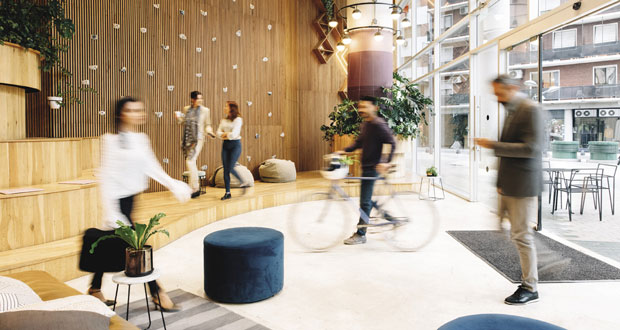BCO RESEARCH
BCO research spans many areas of interest to FMs, including technology(iv) the future of transport(v) and wellness at work(vi). The organisation is also interested in helping ensure the built environment reflects on building inception through to everyday operations and utilises the latest intelligence in building information modelling (BIM) along with real time operational data.
Says Marmot: “With the pandemic, one of the key things we’ve had to do is increase the level of air intake dramatically, and that requires a lot more energy to heat or cool buildings. Sensors providing real-time data have been moving into buildings at a dramatic rate.
“However, it’s still in its infancy and, like any technical change, it will take a while to get established. For example, if every light fitting is to be intelligent, then agreement is needed across a huge number of suppliers on the technology to be installed, and what to do with the legacy of the last version.”
FMs, she believes, need to embrace the value from the data that these technologies can offer. For instance, occupancy sensors at entrances to buildings, and monitoring the use of lifts, had been increasing year by year, providing data to help optimise aspects such as cleaning schedules based on real need rather than routines.
“Unfortunately, in FM we don’t always have the skills to interpret the data. We’ve got a lot of clever gadgets but the knowledge they offer isn’t always shared. Simple questions like ‘why clean a washroom that hasn’t been used all day?’ are answered by ‘because it’s in the contract’. We are not yet in a situation where an evidence base is always available to ensure that staff time, cleaning chemicals, water and electricity are not used unnecessarily, while other places that need cleaning are ignored.”
Commuting is another area where the BCO foresees changes to some FM services that support environmental sustainability and offer health benefits through ‘active travel’. Professor Marmot, notes: “In our BCO Research Committee we sponsored a report on Future Transportation looking ahead into the world of ‘mobility as a service’, forms of autonomous vehicles and ‘active travel’. We looked at what these different approaches might mean in terms of office design, office location, and requirements for vehicle charging, lockers and showers rather than parking.”
Another key area of interest for the BCO is the rise of coworking spaces. This wasn’t taken seriously until relatively recently as a major business model, but according to research it’s growing fast and is definitely no longer the preserve of start-ups.
Says Marmot: “For large organisations, a mixed mode of space is certainly on the cards, with some buildings that it owns or rents long term, and others which its employees just use when needed.”
She adds: “I did some work a few months ago amongst high tech companies in the USA and what they were doing about their workspaces and the results were very interesting. What they are emphasising is green, sustainable, healthy workplaces that look like a holiday or a health resort. That’s a model that says ‘what we want is a world that is sustainable, healthy, fun, sociable, and it isn’t about creating workspaces where you just sit in rows of desks with your head down.’ It’s much more about a sense of a wider community and involvement in the world.”
Professor Marmot recently co-edited a book with Mike Schley for the IFMA Foundation – Work on the Move 3: Building better workplaces after the pandemic. As well as co-editing she wrote two chapters: Global workplace and workforce trends, and Health and Wellbeing at work. It seems that both the BCO and Professor Marmot are most interested in looking at the bigger picture, marrying the big global challenges with the workplace.
“Our research suggests that we need to bring together planetary health and wellbeing with corporate, individual and family health and wellbeing.”

(i) www.bco.org.uk/
(ii) www.bco.org.uk/AboutUs/Committees/Research.aspx
(iii) Space on demand: Coworkspace and space matchmaker apps.
(iv) Use of Wearables in the Office: A review and examples in practice
(v) Future Transport; The implications for office demand and design
(vi) Wellness Matters: Health and wellbeing in offices and what to do about it





